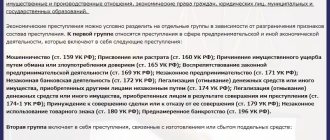Limitation periods
In the event that the claim was drawn up as part of a criminal case, the statute of limitations is equal to the limitation period for bringing the attacker to criminal liability.
If the claim was drawn up regardless of whether a criminal case was initiated or not, the period for it is 3 years from the moment the victim learned that he had suffered material harm.
If the claim was drawn up after the consideration of the criminal case, according to its results, then the period is 3 years from the date on which the court verdict entered into legal force.
A continuing crime. Definition of the concept
The Criminal Code of the Russian Federation does not contain the concept of a continuing crime.
The concept of a continuing crime was given in the Resolution of the 23rd Plenum of the Supreme Court of the USSR dated 03/04/1929 “On the conditions for the application of limitation and amnesty to ongoing and continuing crimes”, where a continuing crime is considered as an action or inaction associated with subsequent long-term failure to fulfill the duties assigned to guilty by law under threat of criminal prosecution.
In judicial practice, an approach has been developed according to which a continuing crime is understood as a criminal act characterized by an initial act of action or inaction and then continuing over time.
A continuing crime begins and forms the completed corpus delicti of a specific crime either from the moment of commission of the first criminal act (for example, when leaving a unit or place of service without permission (Article 337 of the Criminal Code of the Russian Federation) - from the moment of leaving the territory or place of service without legal grounds), or from an act of criminal inaction (for example, when evading military and alternative civil service (Article 328 of the Criminal Code of the Russian Federation) - from the moment of failure to appear on a summons at a recruiting station or other designated place without good reason). Such a crime ends as a result of either the action of the culprit himself, aimed at stopping the crime (for example, turning himself in), or the occurrence of events that prevent the further commission of the crime (for example, intervention by authorities), or when the obligation itself, the failure of which constituted the content of the ongoing crime, has disappeared (for example, with the death of a child or a disabled parent, the obligation of the perpetrator to pay funds for their maintenance, by a court decision, ceases).
For theft
The limitation period for theft is regulated by Art. 158 of the Criminal Code of the Russian Federation.
Definition of the term "theft"
Theft is the theft of someone else's property, or rather its removal without warning the owner.
There are different types of thefts. For example:
- theft that occurred during entry and stay in someone else's home;
- theft, during which the owner of the property was harmed;
- theft committed by a group of persons;
- stealing items from the owner's clothing or bag.
Theft must meet the following criteria:
- have a selfish character;
- the owner of the property should not know about the incident;
- be an illegal act;
- cause damage to the owner of the property.
For ordinary theft, the term is two years, for major theft - 10 years.
Distinguishing between a continuing crime and a set of crimes
A continuing crime must be distinguished from a cumulative crime.
Aggregate crimes - the commission of two or more crimes, for none of which the person was convicted, except for cases where the commission of two or more crimes is provided for by the Special Part of the Criminal Code of the Russian Federation as a circumstance entailing a more severe punishment, as well as one action (inaction) containing signs of crimes provided for by two or more articles of the Criminal Code of the Russian Federation (Article 17 of the Criminal Code of the Russian Federation).
A continuing crime is a single complex crime expressed by an action or inaction, associated with subsequent long-term failure to fulfill the duties imposed on the perpetrator by law under threat of punishment. These crimes are committed over a more or less long period of time. They are characterized by the continuous implementation of the crime. A continuing crime is characterized by the performance of one action or inaction, which is not interrupted until it is suppressed or terminated, which distinguishes it from a continuing crime.
A continuing crime is an act associated with subsequent long-term failure to fulfill the duties assigned to the perpetrator under the threat of criminal prosecution. A continuing crime consists of a number of legally identical acts, united by a single intent, the unity of the object of the attack and the criminal consequences. For example, actions aimed at malicious evasion of a parent from paying child support. That is, a continuing crime cannot be divided into different elements of crimes due to their similarity, unity of purpose and consequences.
If fraud is on a particularly large scale
When determining the statute of limitations for fraud, the degree of severity is taken into account. Actions that caused damage on a particularly large scale deserve special attention. We are talking about a loss of more than 1 million rubles. In this case, the statute of limitations reaches 10 years.
The law provides for liability under Part 4 of Art. 159 of the Criminal Code of the Russian Federation for committing fraud on an especially large scale or by a group of persons. Illegal actions due to which a citizen lost his rights to his own residential premises are also taken into account.
There is also criminal liability in accordance with Part 7 of Art. 159 of the Criminal Code of the Russian Federation, which concerns crimes within the framework of contractual relations in the business sphere. If a crime is committed on a particularly large scale, a similar statute of limitations is established.
When not applicable
Temporary restrictions on initiating legal proceedings do not apply to a number of criminal offenses.
Statutes of limitation do not apply to the following crimes:
- Planning, organizing and carrying out terrorist attacks.
- Planning and carrying out aggressive military actions, including the use of prohibited techniques.
- Extermination of certain groups of the population in accordance with ethnic, religious, racial motives (genocide).
- Violent actions against persons operating on the territory of international institutions (embassies, consulates).
- Armed protests against the current government, carried out with the use of weapons.
- Attempts against public and government figures.
- Seizing power by violent means.
Is there a statute of limitations for murder? Find out the answer right now!
What happens after the deadline expires?
According to paragraph 3 of Art. 24 of the Code of Criminal Procedure of the Russian Federation, if the statute of limitations for economic crimes expires, prosecution is not allowed. In this case, investigative actions or judicial proceedings are terminated, depending on the stage of consideration of the case.
The key point is the day the crime was committed. The period of limitation begins to count from this date. It does not matter the time when the consequences occur in the form of penalties, restrictions or imprisonment. This applies equally to representatives of commercial companies and individuals for tax offenses.
Who risks the most?
The main risk concerns those individuals who avoid investigation or trial. This applies to cases of deliberate evasion, including traveling abroad. In this case, one cannot talk about the statute of limitations or the possibility of rehabilitation.
All this time, the accused, if there is significant evidence, will be considered the person who committed the crime. Moreover, this fact does not depend on whether a fair punishment was established.
In connection with the above circumstances, it is the investigators who must especially strictly monitor compliance with time periods. First of all, it is necessary to accurately establish all the articles and points under which the criminal is accused. This allows you to accurately determine the degree of guilt and maximum liability. The severity depends on these factors and the statute of limitations is set accordingly.
Articles:
At what point does the limitation period begin?
Limitation period for recovery of unjust enrichment
Commentary on Article 78 of the Criminal Code of the Russian Federation
1. The expiration of the statute of limitations from the date of commission of the crime is associated with the positive post-criminal behavior of the guilty person and is the basis for his release from the criminal code.
2. The current criminal legislation of the Russian Federation considers the expiration of the statute of limitations in the complex of exemption from criminal justice and from punishment and expresses it in Art. 78, 83, 94 of the Criminal Code of the Russian Federation. The procedural confirmation of the expiration of the statute of limitations for criminal prosecution and conviction is found in paragraph 3 of Part 1 of Art. 24, paragraph 9, art. 397 and other articles of the Code of Criminal Procedure.
3. Legislative structure comment. Article is expressed by a combination of the following basic conditions: a) the establishment of a statute of limitations by law; b) the expiration of the period established by law from the day the crime was committed until the court verdict enters into legal force; c) the person has not committed crimes against the peace and security of mankind; d) failure of a person to evade investigation or trial. In other words, a person, due to the long period of time that has elapsed since the commission of a crime and relatively lawful behavior during this period, is no longer recognized as socially dangerous, and therefore, the criminal justice cannot be implemented against him. However, in accordance with criminal procedural legislation, it is also possible to resume the proceedings of a criminal case terminated on this basis if new circumstances of the established crime are discovered.
4. The classification of limitation periods is defined in part 1 of the commentary. articles and art. 94. It is close to the classification of crimes committed by the nature and degree of their social danger (see Art. 15), but is not identical to it.
4.1. The statute of limitations for bringing a person to criminal justice is differentiated in accordance with the severity of the punishment and is determined by the size and type of the latter: two years - after the commission of a crime of minor gravity; six years - after committing a crime of average gravity; 10 years - after committing a serious crime; 15 years - after committing a particularly serious crime. The severity of the crime committed is established based on the maximum amount of the most severe type of punishment described in the sanction of that article of the Special Part of the Criminal Code under which the criminal case was initiated.
5. The study of investigative and judicial practice showed that interrogators, investigators, judges as the main and most often the only condition in the application of clause 3, part 1 of Art. 24 of the Code of Criminal Procedure (previously - clause 3, part 1, article 5 of the Code of Criminal Procedure of the RSFSR) highlighted the expiration of the statutory limitation periods. This introduced some complexity into monitoring the legality of the decisions they made and allowed them to leave the period of the statute of limitations unexplored.
5.1. Part 2 comments. The article prescribes that the statute of limitations for bringing a person to criminal justice must be calculated from the day the crime was committed until the court verdict enters into legal force.
5.2. The social danger of a person, and therefore the expiration of the statute of limitations, should be determined from the moment the criminal act was committed. This moment coincides with the time of commission of a socially dangerous act in crimes with a formal composition. This coincidence may not exist in crimes with a material component.
5.3. If material socially dangerous consequences in a crime with a material element have not occurred, then the statute of limitations for prior criminal behavior runs. If such consequences occur, then the statute of limitations runs for the commission of a completed crime. The expiration of the statute of limitations in the first and second cases coincides (see part 1 of the commentary of the article). For example, if a crime was committed at 23:00 on April 1, 2006, then the statute of limitations is calculated from this date, or more precisely, from 0:00 on April 2, 2006, and expires at 24:00 of the previous day of the corresponding year (see Art. 15 and part 1 of Article 78), in particular, in case of insult (Article 130) - at 24 hours on April 1, 2008.
5.4. The statute of limitations for criminal prosecution in connection with the commission of a continuing crime is calculated from the day of its termination (at the will of the guilty person or in addition to it), in particular, from the day following the day of the arrest of the guilty person by the authorities, or the surrender of this person. If a continuing crime is expressed in inaction (failure to perform those actions that a person was obliged to perform), then its termination is associated with the beginning of the guilty person fulfilling his duties or with the termination of the obligation to act. For example, a parent’s malicious evasion of payment by court decision of funds for the maintenance of a minor child (Part 1 of Article 157) ends and the statute of limitations (two years) begins to run if the culprit began to pay the specified funds for the maintenance of the child or the obligation to pay alimony ceased due to when the child reaches 18 years of age.
5.5. The statute of limitations for criminal prosecution in connection with the commission of a continuing crime is calculated from the moment of commission of the last criminal act from among those that together constitute the continuing crime.
5.6. The statute of limitations for preliminary criminal behavior terminated for a reason independent of the will of the person who committed it is calculated from the moment of termination of this behavior (from zero hours of the next day).
5.7. Law enforcers, as a rule, do not come close to the upper limit of the expiration of the statute of limitations in the form of a court verdict that has entered into legal force. In any case, terminating criminal cases under clause 3, part 1, art. 24 of the Code of Criminal Procedure, they calculate the control period from the moment the crime was committed to the day the criminal case was terminated.
5.8. Investigative and judicial practice shows that the termination of criminal cases due to the expiration of the statute of limitations for criminal prosecution is mainly carried out in relation to persons who have committed crimes of minor gravity (the statute of limitations is two years). For minors, this period is reduced by half. The period of the preliminary investigation can be more than two years (more than one year if we are talking about a minor offender), and the period of the trial, even without taking into account the time of appeal and cassation appeal and protesting the court’s guilty verdict, can be no less long.
There is no doubt that the previous practice of applying this rule took into account the procedural features of the preliminary investigation more than the current one. Established Art. 48 of the Criminal Code of the Russian Federation of the RSFSR, the statute of limitations for bringing a person to criminal justice was calculated from the day the crime was committed until the moment charges were brought against him. However, even in this case, it remained possible for the guilty person to resist the progress of the investigation of his criminal behavior if he knew that delaying the proceedings before bringing charges would lead to the expiration of the statute of limitations. At present, the danger of such opposition is greater.
5.9. The moment the sentence comes into force is determined by Art. 390 Code of Criminal Procedure.
6. If a person commits a new crime, the statute of limitations for each criminal act runs independently. A person is considered to have committed a new crime if, in connection with a previous criminal act, the statute of limitations for bringing him to criminal justice has not expired, and also if the person was brought to criminal justice for a previous crime and convicted and the criminal record has not been expunged or removed in the manner prescribed by law (see. Article 86).
7. Part 3 comment. The article determines: the running of the statute of limitations is suspended if the person who committed the crime evades the investigation or trial, and resumes from the moment the person is detained or surrenders, i.e. to the statute of limitations established by law is added the time that has elapsed during the period from the day the person concealed himself from the investigation or court until the day of his arrest or surrender.
7.1. Detention means the delivery of the guilty person to law enforcement agencies to verify his involvement in a crime and select a preventive measure. The day of detention is considered to be the day the protocol of detention is signed by the person who compiled it and the detainee.
7.2. On surrender, see paragraphs 6 - 6.3 comments. to Art. 75.
8. Law enforcers, when dismissing criminal cases due to the expiration of the statute of limitations, often did not attach importance to the fact that the culprit had been hiding from the investigation for a long time. They resolved the question of the evasion or non-evasion of the guilty person ambiguously. If the investigation was not suspended, and in the meantime the culprit hid traces of the crime, successfully disguised himself in the social environment, and remained silent about the crime committed, then the passivity or hopelessness of the investigation could be attributed to the expiration of the statute of limitations. If there were grounds for suspending the preliminary investigation (see clause 2, part 1, article 208 of the Code of Criminal Procedure, previously - clause 1, part 1, article 195 of the RSFSR Code of Criminal Procedure), it means that the person could evade the investigation. However, criminal cases were suspended and subsequently terminated due to the expiration of the statute of limitations, despite the fact that unknown persons secretly stole someone else’s property, unlawfully took possession of someone else’s vehicle without the purpose of stealing, destroyed (damaged) someone else’s property for hooligan reasons, beat up the victims, violated the rules of the road, the operation of vehicles, which resulted in causing corresponding harm to a person’s health, his death, and disappeared.
This investigative tactics do not correspond to the provisions of Part 3 of the commentary. article and cannot be considered positive.
8.1. Investigators, inquiry officers, judges when deciding on the application of clause 3, part 1, art. 24 of the Criminal Procedure Code must carefully examine the post-crime behavior of the guilty person and the motives that guided him in hiding the fact of the crime from law enforcement agencies.
8.2. Evasion from investigation or trial occurs in cases where a person deliberately absconds from justice, i.e. does not appear when called by the preliminary investigation authorities or the court, deliberately changes his place of permanent or temporary residence or documents identifying him, changes his appearance, etc.
8.3. Failure of a person to evade investigation or trial can be recognized as the perpetrator’s uncertainty that he has committed a crime (for example, through negligence), limitation of the scope of public relations due to his illness, difficult family situation or other circumstances, lawful daily exercise of subjective rights and legal obligations, failure associated with the falsification of factual data about the crime committed, but associated with keeping it secret for the benefit of third parties or for other reasons. It seems that more detailed argumentation for a person’s failure to evade an investigation or trial should be further provided for by the relevant departmental legal acts.
8.4. Failure of a person to evade investigation or trial during the statute of limitations, or failure to commit another crime during this period indicate the lawful behavior (in the narrow sense of the word) of this person for a certain time. And although during this time period various kinds of restrictions and obligations were not imposed on the guilty person in connection with the crime committed, the statute of limitations established by law was a kind of probationary period, during which the person led a law-abiding lifestyle.
9. Particularly serious crimes require increased attention to them, despite the fact that even after their commission a kind of probationary (limitation) period is provided (see paragraph “d”, part 1 of the commentary article). Part 4 comments. Article only some of these crimes (punishable by death or life imprisonment) are included in the category of optional exemption from the Criminal Code, i.e. gives the court the right to decide on the possibility of release. If the court does not consider it possible to release the guilty persons from the criminal justice system due to the expiration of the statute of limitations, then the death penalty or life imprisonment will not be applied. In this case, the person may be sentenced to imprisonment for a certain period.
10. Sufficiency of control over the validity and legality of decisions of law enforcement officers to terminate criminal cases (refusal to initiate them) under clause 3 of part 1 of art. 24 of the Code of Criminal Procedure (previously - clause 3, part 1, article 5 of the Code of Criminal Procedure of the RSFSR) raised and raises doubts.
Resolutions to terminate criminal cases due to the expiration of the statute of limitations, as a rule, were not sanctioned by the prosecutor, but were approved by the superior of the person who terminated the case. The prosecutor was notified of a copy of the resolution. This state of affairs, while generally meeting the requirements of criminal procedural legislation (see Art. 213 of the Code of Criminal Procedure; previously - Art. 209 of the Code of Criminal Procedure of the RSFSR), contradicted the order of the Prosecutor General's Office of the Russian Federation (see the instruction of the Prosecutor General's Office of the Russian Federation dated March 13, 1997 N 10/15 “On procedure for terminating criminal cases suspended due to failure to identify the perpetrators after the statute of limitations has expired"), stating that the decision to terminate criminal proceedings must be approved by the prosecutor. The contradiction persisted until the said order was amended and supplemented by the order of the Prosecutor General's Office of the Russian Federation dated July 18, 2001 N 44/4 - the words “decrees to terminate a criminal case must be approved by the prosecutor” were deleted. True, the same instruction determines that the investigator, the body of inquiry, in the event of a decision to terminate the criminal investigation after the expiration of the statute of limitations, must immediately send a copy of the decision to terminate the criminal investigation to the prosecutor along with the criminal case. Later, the instruction on the need to provide the prosecutor with a copy of the decision to terminate proceedings along with the criminal case was reflected in the Order of the Prosecutor General's Office of Russia dated 05.05.2004 N 12, which replaced the above instructions, “On the procedure for terminating, upon expiration of the statute of limitations, criminal cases suspended for failure to identify the persons who committed the crimes” < 1>. However, the general rule remains unchanged (see Art. 213 of the Code of Criminal Procedure). ——————————— <1> Legality. 2004. N 7.
Thus, the Prosecutor General's Office of the Russian Federation, both in the instruction dated March 13, 1997 N 10/15, and in the Order dated May 5, 2004 N 12, contrary to Part 5 of Art. 5 Code of Criminal Procedure of the RSFSR, Part 2 Art. 27 of the Code of Criminal Procedure proposed to terminate criminal cases due to the expiration of the statute of limitations in relation to persons who were not recognized in the manner prescribed by law as accused (or suspects - see Part 2 of Article 27 of the Code of Criminal Procedure as amended by Federal Law No. 58-FZ of May 29, 2002), which allowed, with reference to Part 5 of Art. 195 and paragraph 3, part 1, art. 5 Code of Criminal Procedure of the RSFSR; Part 1 Art. 212 and paragraph 3, part 1, art. 24 of the Code of Criminal Procedure to terminate suspended criminal cases, without always taking all the necessary criminal procedural measures to identify and search for persons who committed crimes.
The stated legal provisions of the Prosecutor General's Office of the Russian Federation not only contributed to the weakening of control over the state of the rule of law at the stages of the preliminary investigation, but also came into certain conflict with Part 3 of the commentary. articles. It is difficult, if not impossible, to establish the fact of evasion or non-evasion of a person who committed a crime from an investigation or trial if such a person has not been identified.
In addition, investigative practice shows that the lack of proper control when terminating criminal cases due to the expiration of the statute of limitations often deprives victims of the right to compensation for harm caused by the crime, contrary to Part 4 of Art. 213 of the Code of Criminal Procedure does not explain the right to demand compensation for damage caused in civil proceedings.
10.1. On joint compensation for damage caused by the crime in connection with the application of clause 3, part 1, art. 5 Code of Criminal Procedure of the RSFSR, clause 3, part 1, art. 24 of the Code of Criminal Procedure, see paragraph 5 of the Resolution of the Plenum of the USSR Supreme Court No. 1.
11. Termination of criminal proceedings due to the expiration of the statute of limitations is not allowed, and a discontinued case is resumed by proceedings if the suspect or accused objects to this. The prosecutor has the right, by his decision, if there are grounds for doing so, to cancel the investigator’s decision to terminate the criminal investigation and resume the proceedings in the case (see Part 2 of Article 27, Article 214 of the Code of Criminal Procedure).
12. During the statute of limitations for bringing a person to the DA, the PD terminated in accordance with Part 3 of Art. 214 and part 3 of Art. 414 of the Code of Criminal Procedure can be renewed due to newly discovered circumstances, but no later than one year from the date of discovery of new circumstances.
13. If the expiration of the statute of limitations for bringing a person to criminal justice is discovered at the stage of trial, the court continues to consider the criminal case in the usual manner until it is resolved on the merits and pronounces a guilty verdict with the release of the convicted person from punishment (see Part 8 of Article 302 of the Code of Criminal Procedure). This provision to some extent contradicts Part 1 of the comment. article, according to which a person should be released not from punishment, but from the criminal punishment.
14. Statutes of limitation do not apply to persons who have committed crimes against the peace and security of mankind, provided for in Art. 353, 356 - 358.
14.1. Nazi criminals guilty of the gravest atrocities against peace and humanity, war crimes, are subject to trial and punishment regardless of the time that has elapsed since their crimes were committed <1>. This provision also applies to those citizens who, during the Great Patriotic War of 1941-1945, collaborating with the Nazis, carried out active punitive activities, took part in the murders and torture of civilians <2>. ——————————— <1> See: Gazette of the USSR. 1965. N 10. Art. 123.
<2> See: Ibid. N 37. Art. 532.
14.2. The right and obligation to punish individuals who have committed crimes against the peace and security of mankind are recognized by the state on whose territory these crimes were committed. However, the jurisdiction of a given state may be supplemented by the jurisdiction of an international criminal court (tribunal) specially created by an international convention. Persons accused of committing these crimes may be tried by this criminal court (tribunal), provided that the parties to this convention have accepted the jurisdiction of such a court <1>. ——————————— <1> See: Collection of existing treaties, agreements, conventions concluded by the USSR with foreign states. Vol. XVI. M., 1957. S. 66 - 71; Vol. XXXII. M., 1978. S. 58 - 63.
14.3. In addition to the persons who committed crimes or committed them on their own initiative, the leaders, organizers, instigators and accomplices of these criminal acts, including rulers, diplomats, scientists, financiers, lawyers, publicists, etc., should be involved in the CR.







